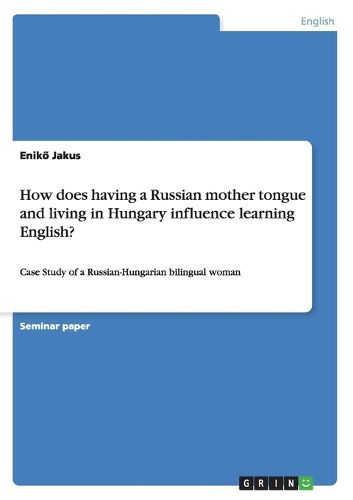Readings Newsletter
Become a Readings Member to make your shopping experience even easier.
Sign in or sign up for free!
You’re not far away from qualifying for FREE standard shipping within Australia
You’ve qualified for FREE standard shipping within Australia
The cart is loading…






Seminar paper from the year 2011 in the subject English Language and Literature Studies - Other, grade: sehr gut, Eoetvoes Lorand Tudomanyegytem, language: English, abstract: Nowadays, in a globalized world where cross-cultural relationships are of key importance, multilingualism becomes more and more common, as well as families of mixed nations using more than one language. As a result of these, more and more children are growing up as bilingual or even as trilingual. It is interesting how these children can acquire two or more languages on a native-like level in their early childhood and how they learn foreign languages later at school. The aim of this paper is to explore this field using a case study of a Russian-Hungarian bilingual woman in Hungary. The purpose of the research is to find out what influences the bilingual background could have on the person’s foreign language learning, especially on learning English. The main question to be answered in this paper is: How does having a Russian-Hungarian mother tongue influence learning English? The hypothesized result is that the bilingual research participant experiences many positive factors because she already speaks two languages which is a cognitive advantage for her.
$9.00 standard shipping within Australia
FREE standard shipping within Australia for orders over $100.00
Express & International shipping calculated at checkout
Seminar paper from the year 2011 in the subject English Language and Literature Studies - Other, grade: sehr gut, Eoetvoes Lorand Tudomanyegytem, language: English, abstract: Nowadays, in a globalized world where cross-cultural relationships are of key importance, multilingualism becomes more and more common, as well as families of mixed nations using more than one language. As a result of these, more and more children are growing up as bilingual or even as trilingual. It is interesting how these children can acquire two or more languages on a native-like level in their early childhood and how they learn foreign languages later at school. The aim of this paper is to explore this field using a case study of a Russian-Hungarian bilingual woman in Hungary. The purpose of the research is to find out what influences the bilingual background could have on the person’s foreign language learning, especially on learning English. The main question to be answered in this paper is: How does having a Russian-Hungarian mother tongue influence learning English? The hypothesized result is that the bilingual research participant experiences many positive factors because she already speaks two languages which is a cognitive advantage for her.